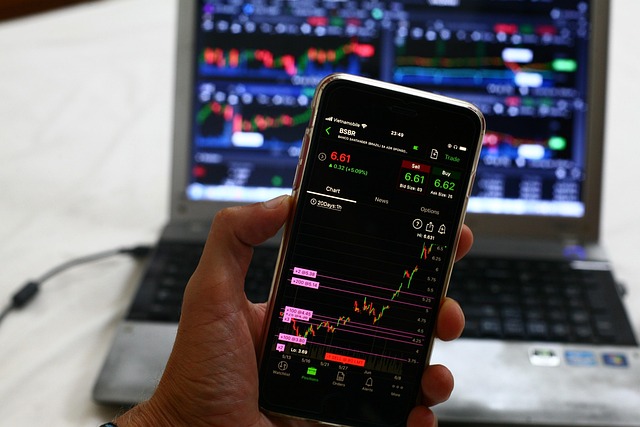Trading Apps for Students Under 18: A Comprehensive Guide to Safe and Responsible Investing
Author: Jameson Richman Expert
Published On: 2025-09-15
Prepared by Jameson Richman and our team of experts with over a decade of experience in cryptocurrency and digital asset analysis. Learn more about us.
Trading apps specifically designed for students under 18 are rapidly gaining popularity, driven by the increasing digital literacy of young people and their curiosity about financial markets. This trend aligns with a broader emphasis on early financial education, recognizing that the habits and knowledge gained during adolescence can shape responsible investing behaviors in adulthood. With the advent of cryptocurrencies, stock trading simulators, and beginner-friendly investment platforms, youth are eager to explore wealth management and market analysis. However, minors face unique vulnerabilities, including limited experience, susceptibility to scams, and strict regulatory restrictions that are intended to protect them from financial harm. This comprehensive guide aims to provide detailed insights into selecting age-appropriate platforms, utilizing simulation and educational tools effectively, understanding the legal landscape, evaluating suitable apps, and adopting best safety practices. Our goal is to equip parents, guardians, and young investors with the knowledge necessary to foster secure, educational, and responsible financial engagement, laying a solid foundation for future financial literacy.

Why Using Age-Appropriate Trading Platforms Is Crucial
Trading involves significant financial risks—ranging from monetary losses to emotional stress and impulsive decision-making—that can be particularly detrimental to minors who are still developing critical thinking skills. The cognitive development of teenagers means they might underestimate the risks of volatility or overestimate their ability to predict market movements. Recognizing these vulnerabilities, regulatory bodies such as the Securities and Exchange Commission (SEC) in the United States and the European Securities and Markets Authority (ESMA) in the EU enforce stringent rules to protect minors from exploitation and unwise investments. These regulations often restrict direct access to trading accounts for those under 18, advocating instead for supervised, age-appropriate platforms. Such platforms emphasize educational content, gamification, and parental oversight to create safe environments where minors can learn about investing without risking real money prematurely. Importantly, these tools help minors develop key skills like patience, discipline, and analytical thinking—traits essential for responsible investing as they mature.
The Power of Simulated Trading and Educational Apps
Simulated trading platforms serve as invaluable tools for minors, effectively bridging the gap between theoretical knowledge and practical experience without exposing them to financial risk. These platforms typically mimic real-world markets using virtual funds, allowing students to experiment freely. They offer several core features that foster deep learning:
- Risk-free experimentation: Minors can practice executing different order types—such as market orders, limit orders, stop-loss, and take-profit—analyzing outcomes to understand the mechanics of trading without actual monetary exposure.
- Gamification and engagement: Incorporating quizzes, achievement badges, leaderboards, and real-time market data transforms learning into an interactive experience that enhances motivation and retention.
- Progressive learning complexity: Platforms gradually introduce more complex concepts, including diversification strategies, sector analysis, and technical indicators, aligning with the learner’s increasing understanding.
- Broader economic context: Embedding lessons on macroeconomic factors, geopolitical events, and economic indicators fosters holistic comprehension of how markets operate on a global scale.
Popular platforms such as Investopedia Stock Simulator, HowTheMarketWorks, and the StockMarketGame integrate educational modules into their environments, emphasizing long-term investing principles like patience, diversification, and data-driven decision-making. These platforms cultivate good habits—such as disciplined investing, critical analysis, and emotional control—that are essential for responsible trading in the future. By engaging with these tools, minors can build confidence and foundational knowledge, easing the transition to real trading when legally permitted.
Legal and Regulatory Landscape for Minors in Trading
Legal restrictions are fundamental considerations for minors interested in trading. Globally, authorities enforce rules designed to prevent exploitation, impulsive decisions, and unwise financial commitments. Key frameworks include:
- United States: The SEC mandates a minimum age of 18 for opening standard brokerage accounts. Minors can participate through custodial accounts such as UGMA (Uniform Gifts to Minors Act) or UTMA (Uniform Transfers to Minors Act), which are managed by an adult guardian until the minor reaches the age of majority (usually 18 or 21). These accounts allow minors to own securities and other investments legally, with oversight ensuring compliance and safeguarding.
- European Union: Under the MiFID II regulations, strict age-verification processes, comprehensive disclosures, and safeguarding protocols prevent minors from independently accessing trading platforms. Parental consent and supervision are often required, and platforms implement robust Know Your Customer (KYC) procedures to verify identities and ages.
- Other jurisdictions: Many countries impose similar restrictions, emphasizing parental involvement, supervised accounts, and financial literacy as prerequisites for minors to engage with investments.
Parents and guardians are integral in navigating these legal frameworks. They can set up custodial accounts, oversee trading activities, and guide investment decisions to ensure legal compliance and promote responsible behavior. Many platforms now offer dedicated custodial accounts with parental controls, which facilitate active monitoring and educational oversight, reinforcing the importance of guided learning.

Top Trading and Educational Platforms for Minors
While most traditional trading platforms restrict minors from engaging in live trades, several specialized platforms cater to educational purposes, simulated environments, or custodial arrangements. Here’s an in-depth review of some notable options:
Binance
As one of the world's most prominent cryptocurrency exchanges, Binance offers extensive educational resources through Binance Academy, which covers blockchain technology, crypto trading fundamentals, and market analysis. Although Binance’s standard registration requires users to be at least 18, the platform’s emphasis on educational content and simulated trading contests makes it an excellent introductory portal for minors exploring digital assets. Under parental supervision, minors can study crypto markets, learn about security best practices, and develop long-term holding strategies without risking actual funds. As they approach legal age, they may transition into real trading, armed with foundational knowledge about crypto volatility and secure trading habits.
MEXC Global
MEXC provides a broad range of cryptocurrencies, demo trading modes, and educational tools for beginners. Its structured referral and reward systems are designed to promote responsible exploration within a controlled environment. Custodial or supervised accounts tailored for minors ensure compliance with local laws. The platform emphasizes blockchain technology understanding, digital asset management, and risk awareness, fostering early familiarity with the evolving crypto space and responsible decision-making.
Bitget
Bitget specializes in derivatives, futures, and options trading, offering comprehensive educational webinars, tutorials, and simulated trading environments—often involving leverage and margin trading. While minors cannot engage in live derivatives trading directly, participating in demo environments under guardianship can help them understand complex trading strategies, risk management, and the importance of leverage. Guardians should ensure that minors comprehend the risks associated with margin trading, margin calls, and leverage before transitioning to real trading. Bitget’s emphasis on risk controls makes it suitable for foundational derivatives education.
Bybit
Bybit emphasizes security and education, providing extensive demo accounts and structured learning modules tailored for beginners. Its responsible trading features, such as setting trading limits and educational prompts, make it suitable for supervised exploration. Minors interested in more advanced trading should involve guardians to set boundaries, monitor activities, and reinforce responsible decision-making. Bybit’s tutorials on technical analysis, risk management, and only investing what one can afford to lose are particularly beneficial for young learners developing their trading acumen.
Key Safety and Security Tips for Young Traders
Prioritizing safety is critical when minors are involved in trading activities. Here are essential tips to protect their security and foster responsible habits:
- Choose regulated platforms: Always select apps compliant with local financial authorities that adhere to strict security standards, transparency, and customer protection laws.
- Activate security features: Enable two-factor authentication (2FA), use strong, unique passwords, and set up account alerts to detect suspicious activities promptly.
- Educate about scams: Teach minors to recognize phishing emails, fake websites, and fraudulent schemes prevalent in online trading environments. Cultivating skepticism towards unsolicited investment offers is vital.
- Limit access and transactions: Use parental controls, supervised accounts, and educational modes to prevent impulsive or unauthorized trades, ensuring that trading remains a learning activity rather than a financial gamble.
- Promote responsible investing: Reinforce that investments should only be made with money they can afford to lose, and stress understanding the risks before making any trades.
- Protect personal data: Educate minors on safeguarding login credentials and personal information to avoid identity theft, scams, and data breaches.
The Critical Role of Parents and Guardians in Responsible Trading
Parents and guardians are pivotal in creating a safe, educational, and ethical environment for minors exploring trading. Effective strategies include:
- Establish custodial or joint accounts: These accounts offer oversight, ensure legal compliance, and enable guardians to monitor and guide transactions actively.
- Set clear guidelines: Define maximum trading limits, specify educational objectives, and clarify acceptable investment types, promoting responsible exploration.
- Build financial literacy: Use books, online courses, and open dialogue to develop foundational knowledge, critical thinking, and risk assessment skills.
- Encourage patience and discipline: Emphasize that investing is a long-term journey involving continuous learning, emotional regulation, and disciplined decision-making.
- Maintain open communication: Regularly discuss market news, investment principles, and personal experiences to reinforce responsible behavior and curiosity.
By actively participating in their financial education, parents help young investors develop confidence and responsibility, setting the stage for a healthy relationship with personal finance and future investment decisions.

Conclusion: Building a Foundation for Safe and Responsible Investment Education
Although current regulations limit minors from engaging in direct, live-money trading, the availability of educational tools, simulated trading environments, and supervised platforms provides a rich landscape for responsible learning. Prioritizing financial literacy, understanding risks, and cultivating disciplined habits are essential steps in preparing the next generation for navigating complex financial markets. As technology advances and regulatory landscapes evolve, more sophisticated, secure, and age-appropriate tools tailored for young learners will emerge, further supporting responsible investing. Thoughtful guidance today ensures that young investors develop prudent decision-making skills, ethical practices, and confidence—traits necessary for a resilient and well-informed financial future.